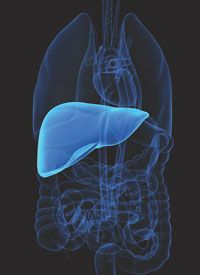Predictive Biomarkers Not Found in STORM Study for Sorafenib in HCC
Hepatocyte pERK-positive immunostaining and microvascular invasion were independent prognostic factors of recurrence-free survival for patients with hepatocellular carcinoma treated with adjuvant sorafenib. According to an analysis of the phase III STORM study presented at the 11th International Liver Cancer Association Annual Conference, a predictive biomarker for recurrence was not uncovered.
Liver

Hepatocyte pERK-positive immunostaining and microvascular invasion were independent prognostic factors of recurrence-free survival (RFS) for patients with hepatocellular carcinoma (HCC) treated with adjuvant sorafenib (Nexavar). According to an analysis of the phase III STORM study presented at the 11th International Liver Cancer Association Annual Conference, a predictive biomarker for recurrence was not uncovered.1,2
No significant difference in RFS, time to recurrence, and overall survival was found in the STORM trial for patients being treated with adjuvant sorafenib compared with a placebo. Due to the adjuvant trial design, tissue samples were evaluated for biomarker analysis aimed at determining the molecular prognostic factors and predictors of recurrence with sorafenib.
Overall, no biomarkers related to angiogenesis, proliferation, previously proposed gene signatures, or mutations were independently associated with recurrence or prevention for sorafenib. Recurrence often occurs after resection in 70% of patients at 5 years, according to Robert Montal, MD, a visiting researcher of Mount Sinai Health System in an interview withTargeted Oncology.
“The idea of the companion biomarker clinical trial was to infer molecular alterations that could discriminate the subpopulation of patients that could benefit from sorafenib in the adjuvant setting,” said Montal.
The STORM trial collected tumor samples from 188 patients with resected HCC, 83 of which were treated with sorafenib, whereas 105 patients were treated with placebo. Prognostic and predictive biomarkers were analyzed by gene expression, targeted exome sequencing of 18 mutational drivers, assessment of activation of MAPK signaling, and angiogenesis.
Positive hepatocyte pERK staining (HR, 2.41; 95% CI, 1.21-4.8;P= .012) and microvascular invasion were independent prognostic factors in regards to predictive variables for RFS. In the STORM trial, RFS events occurred in 70 cases.
There was an association between hepatocyte pERK-positive and proliferation gene signatures (P<.001), poor differentiation (P= .01) and Ki-67 positivity (P<.05).
The STORM trial did not identify candidate biomarkers predicting recurrence prevention to sorafenib. Biomarkers related to angiogenesis, proliferation, previously proposed gene signatures, or mutations were not independently associated with recurrence or prevention with sorafenib.
However, the investigators generated a multi-gene signature that did correlate with improved RFS with sorafenib versus placebo, but this would require external validation.
“None of the pre-specified biomarkers obtained the statistically significant results in terms of the prediction of benefit to sorafenib,” Montal explained. “We designed a gene signature composed of 146 genes that are able to identify those patients in our cohort that benefit from sorafenib, but certainly, these gene signatures should be externally evaluated for assessing its clinical validity.”
Questions remain in determining how to incorporate biomarkers into clinical practice for HCC, especially on using them to identify patients who would best respond to current and emerging therapies.
“In HCC and similar to other solid tumors, these predictive biomarkers have not been incorporated yet in the clinical practice. In fact, most of the phase III trials assessing new drugs in HCC have failed targeting all-comers. The idea would be to start the development of new drugs in HCC together with the predictive biomarkers from the further stems of the clinical research,” said Montal.
Another area of increasing interest regarding biomarkers for HCC is the development and optimization of liquid biopsies as a way to help determine the biology of tumors. Additionally, the survival benefit shown with systemic therapies, such as sorafenib, regorafenib (Stivarga), and lenvatinib (Lenvima), in phase III trials are continuing to be investigated. Immune checkpoint inhibitors are also being studied in HCC as they have dramatically changed the standard of care in other solid tumors, most notably in nonsmall cell lung cancer, melanoma, and urothelial carcinoma. In liver cancer, the PD-1 inhibitor nivolumab (Opdivo) has shown promising phase II results in patients with advanced HCC, as seen in the CheckMate-040 trial.
References:
- Pinyol R, Montal R, Takayama T, et al. Molecular predictors of recurrence prevention with sorafenib as adjuvant therapy in hepatocellular carcinoma: biomarker study of the STORM phase III trial.Journal of Hepatol.2017;66(1):S12-S13. doi:10.1016/s0168-8278(17)30287-8.
- Pinyol R, Montal R, Quetglas IM, et al. Molecular predictors of recurrence prevention with sorafenib as adjuvant therapy in hepatocellular carcinoma: biomarker study of the STORM phase III trial. In: Proceedings from the 11th International Liver Cancer Association Annual Conference; September 15 to 17, 2017; Seoul, South Korea. Abstract 0-002.